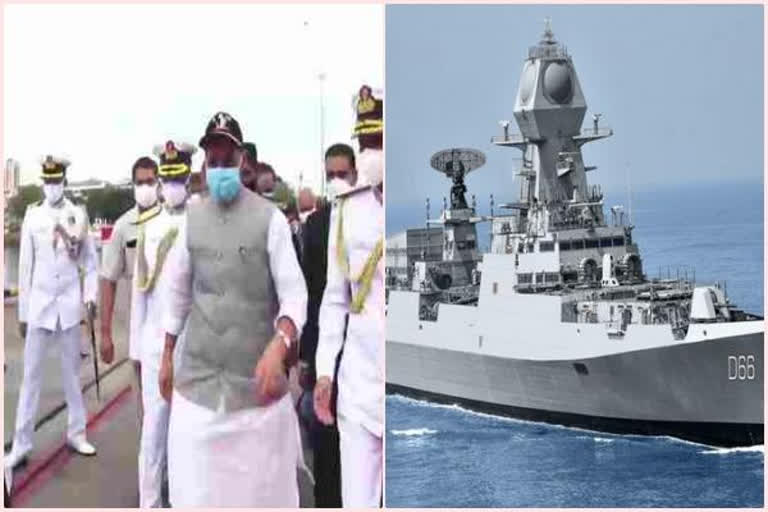Mumbai: It is the primary objective of the Indian Navy to keep the Indo-Pacific route safe as it is important for the world economy, disclosed Minister for Defence Rajnath Singh. He was speaking at the commissioning ceremony of the INS Visakhapatnam here on Sunday.
"The world is enhancing its Military power in coming years and expenditure on defence budget will increase. We have moved towards the development of an indigenous shipbuilding hub," he said.
"Out of 41 ships ordered by Indian Navy 38 ships have been developed in the country. It is the best example of indigenisation," he pointed out. He formally commissioned the INS Visakhapatnam in Mumbai.
INS Visakhapatnam is the first stealth-guided missile destroyer ship of Project 15B. It has been constructed using indigenous steel DMR 249A and is amongst the largest destroyers constructed in India with an overall length of 163m and displacement of over 7,400 tonnes.
The ship has a significant indigenous content of approximately 75 per cent contributing towards Atma Nirbhar Bharat. The ship is a potent platform capable of undertaking multifarious tasks and missions spanning the full spectrum of maritime warfare.
Visakhapatnam is equipped with an array of weapons and sensors, which include supersonic surface-to-surface and surface-to-air missiles, medium and short-range guns, anti-submarine rockets and advanced electronic warfare and communication suits.
The ship is propelled by a powerful combined gas and gas propulsion, which enables her speed of over 30 knots. The ship has the capability of embarking two integrated helicopters to further extend its reach. The ship boasts of a very high level of automation with sophisticated digital networks, a Combat Management System and an Integrated Platform Management System.
Rajnath Singh takes dig at China
Speaking at the event, the defence minister said "some irresponsible nations" for the sake of their narrow partisan interests and hegemonic tendencies are coming up with inappropriate interpretations of the UN Convention on the Law of the Sea (UNCLOS).
It is a matter of concern that UNCLOS is being repeatedly weakened by arbitrary interpretation of its definition by some nations, Singh said, after commissioning of Indian Navy's destroyer Visakhapatnam here.
As a responsible maritime stakeholder, India supports consensus-based principles and a peaceful, open, rule-based stable maritime order, Singh said.
India envisions a rule-based Indo-Pacific, with freedom of navigation, free trade and universal values, in which the interests of all the participating countries are protected, he added.
Singh underscored the importance of a rule-based freedom of navigation and security of sea lanes in the present era of globalisation to ensure stability, economic progress and development of the world. The UNCLOS 1982 specifies about any country's territorial waters, exclusive economic zone and good order at sea, he said.
The arbitrary interpretations create obstacles in the path of a rule-based maritime order, he said. There are some nations - I would like to say irresponsible nations (who) for the sake of their narrow partisan interests, keep on giving new and inappropriate interpretations to these international laws from hegemonic tendencies, Singh said without naming China.
China has been militarizing islands in South China, a move that has attracted global criticism. The area has overlapping claims of several East and Southeast Asian nations.
"Indian Navy's role crucial to security of Indo-Pacific"
In 2016, an international tribunal rejected China's argument that it enjoys historic rights over most of the South China Sea -- a region known to be rich in hydrocarbons and also hosting an important Sea Lane of Communication. Following the order, China said the award is "null and void and has no binding force" and it neither accepts nor recognises it.
Noting that the Indo-Pacific is important for the whole world, Singh said the region sees the passage of two-third of oil shipments of the world, one-third of the bulk cargo and more than half of container traffic. Singh said as an important country in the region, the Indian Navy's role assumes a more crucial role for the region's security.
It becomes the primary objective of the Indian Navy to keep the Indo-Pacific open, safe and secure, he said. Singh asserted that India's interests are directly linked with the Indian Ocean and the region is crucial for the world economy.
Challenges such as piracy, terrorism, illegal smuggling of arms and narcotics, human trafficking, illegal fishing and damage to the environment are equally responsible for affecting the maritime domain. Therefore, the role of the Indian Navy becomes very important in the entire Indo-Pacific region, he added.
Countries world over are working towards making their military power strong and modern due to global security reasons, border disputes and importance to maintain maritime dominance, he said.
There is a rising demand for military equipment. Reports suggest that the world over the cost for security is expected to reach USD 2.1 trillion. In 5-10 years, this is expected to rise manifold, Singh noted.
"We have an opportunity to use all our capacity, take advantage of the policies, and make the country a hub in indigenous shipbuilding," Singh said.
With the changing power dynamics in the Indian Ocean region, INS Visakhapatnam will augment the Indian Navy's mobility, reach and flexibility towards the accomplishment of its tasks and goals, Singh said.
(With inputs from agencies)



